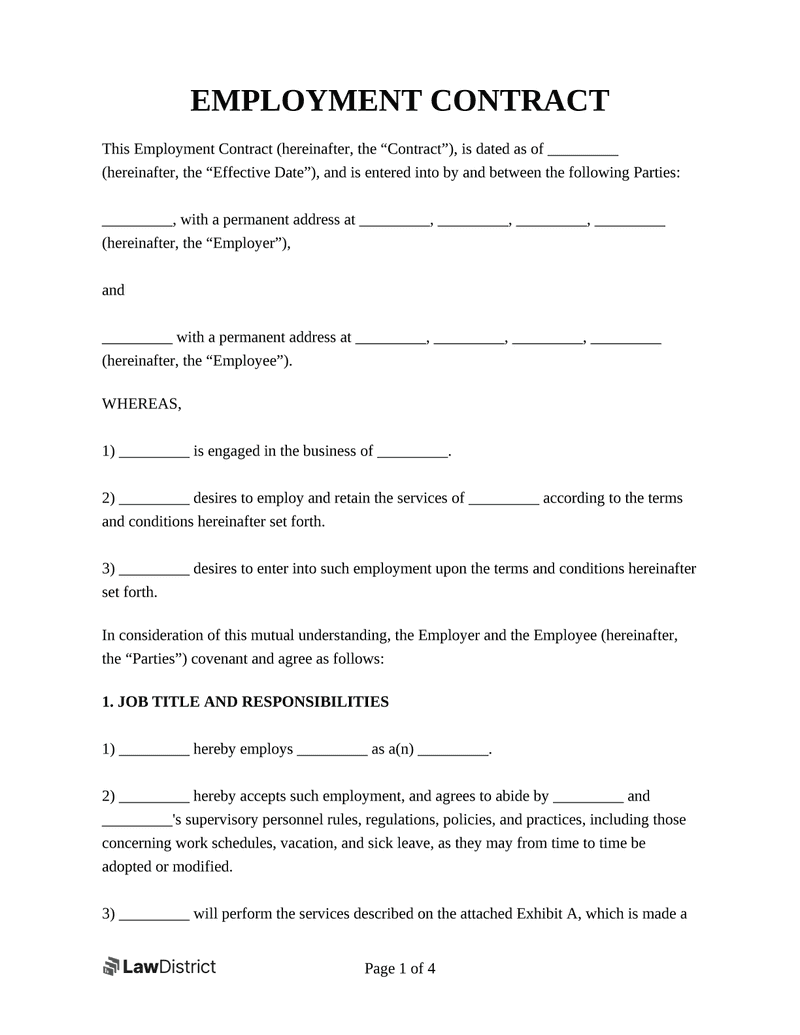This Employment Contract (hereinafter, the “Contract”), is dated as of _________ (hereinafter, the “Effective Date”), and is entered into by and between the following Parties:
_________, with a permanent address at _________, on behalf of _________ (hereinafter, the “Employer”),
and
_________ with a permanent address at _________ (hereinafter, the “Employee”).
WHEREAS,
1) _________ is engaged in the business of _________.
2) _________ desires to employ and retain the services of _________ according to the terms and conditions hereinafter set forth.
3) _________ desires to enter into such employment upon the terms and conditions hereinafter set forth.
In consideration of this mutual understanding, the Employer and the Employee (hereinafter, the “Parties”) covenant and agree as follows:
1. JOB TITLE AND RESPONSIBILITIES
1) _________ hereby employs _________ as a(n) _________.
2) _________ hereby accepts such employment, and agrees to abide by _________ and _________'s supervisory personnel rules, regulations, policies, and practices, including those concerning work schedules, vacation, and sick leave, as they may from time to time be adopted or modified.
3) _________ will perform the services described on the attached Exhibit A, which is made a part of this Contract by this reference.
4) _________'s title and responsibilities may be changed by agreement during the course of this Contract. However, the terms and conditions set forth in this Contract shall remain in full force and effect, unless otherwise specified by the Parties.
Best Efforts of Employee: _________ will at all times faithfully, industriously, and to the best of _________'s ability, experience, and talents, perform all the duties that may be required by the express and implicit terms of this Contract, to the reasonable satisfaction of _________. Such duties shall be provided at such place(s) as the needs, business, or opportunities of _________ may require from time to time.
2. PLACE OF WORK
_________ will primarily perform the job duties at the following location:
- _________.
Indefinite Term: This Contract shall become effective on the _________ and shall continue to have effect for an indefinite term of years, unless otherwise terminated in accordance with the provisions of this Contract.
4. OWNERSHIP OF WORK
_________ acknowledges and agrees that all intellectual property and related material, including but not limited to any copyrightable works, ideas, discoveries, inventions, patents, products, or other information (hereinafter, the “Work Product”), performed under this Contract shall be owned by and belong exclusively to _________.
If requested by _________, _________ will provide and execute all necessary documentation to confirm or perfect the ownership of _________ to the Work Product.
5. TERMINATION
1) Employee's Termination: _________ shall have the right to terminate this Contract at any time, with or without notice, in accordance with applicable local, state, and federal labor laws.
2) Employer's Termination: _________ shall have the right to terminate this Contract at any time, with or without notice, in accordance with applicable local, state, and federal labor laws.
If _________ is in violation of this Contract, _________ may terminate employment without notice and with compensation to _________ only to the date of such termination. The compensation paid under this Contract will be considered _________'s exclusive remedy.
6. NOTICES
Any and all notices, requests, demands, or other communications to be given under this Contract must be given (i) in writing and (ii) personally delivered, mailed, or transmitted by electronic mail to the Party to whom such notice or communication is directed.
Notices will be deemed received when hand delivered, delivered by agent, seven (7) days after being placed in the post, postage prepaid, or three (3) days after transmission by electronic mail, addressed as follows:
Employer:
_________
_________
_________
Employee:
_________
_________
_________
Change of Address: Either Party may, from time to time, change its address by providing written notice to the other Party in the aforementioned manner.
Governing Law: This Contract shall be governed, construed and interpreted in accordance with the laws of the .
Non-Discrimination: The Parties shall not discriminate against any Employee or participant in the performance of the duties, responsibilities, and obligations under this Contract because of race, color, religion, gender, age, marital status, disability, political or religious beliefs, national or ethnic origin.
Entire Agreement: This document constitutes the entire agreement and understanding between the Parties, and supersedes all prior agreements and understandings, whether oral or written, with respect to the subject matter of this Contract.
Severability: This Contract will be enforced to the fullest extent permitted by applicable law. If for any reason any term or provision of this Contract is held to be invalid or unenforceable, such invalidity or unenforceability will not affect any other term or provision of it. However, the Parties shall cease performing such invalid or unenforceable provision and negotiate in good faith to replace such invalid or unenforceable provision with a valid, legal and enforceable one consistent with its original purpose.
Amendment: This Contract may be amended or modified as needed. However, any modification, variation, or amendment of it shall only be valid if made in writing and duly signed by the Parties obligated under the amendment.
Waiver Of Contractual Right: The waiver by either Party of a breach, default, delay, or omission of any of the provisions of this Contract by the other Party will not be construed as a waiver of any subsequent breach of the same or other provisions.
IN WITNESS AND AGREEMENT WHEREOF, _________, on behalf of _________ has executed this Contract with the consent of _________, given here in writing. This Contract is effective as of the date _________ above written.
By: ___________________________________ Date: __________________
_________
_________
By: ___________________________________ Date: __________________
_________

